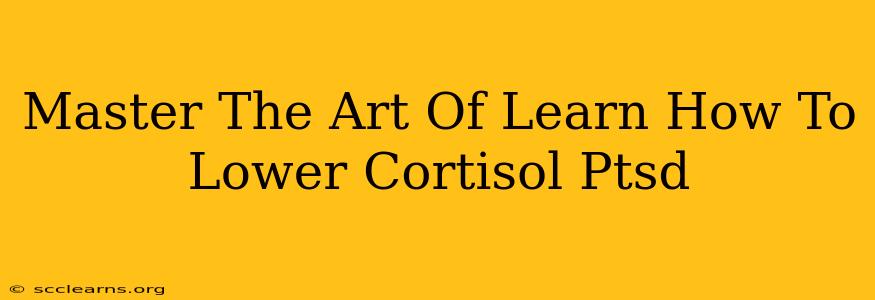Post-traumatic stress disorder (PTSD) significantly impacts millions, disrupting daily life and overall well-being. A crucial factor contributing to PTSD symptoms is elevated cortisol, the primary stress hormone. Learning to manage and lower cortisol levels is therefore a vital step in managing PTSD and improving quality of life. This comprehensive guide explores effective strategies to naturally reduce cortisol and reclaim your peace of mind.
Understanding the Cortisol-PTSD Connection
High cortisol levels are frequently observed in individuals with PTSD. Trauma triggers the release of excessive cortisol, creating a sustained state of hyper-arousal. This chronic elevation contributes to many PTSD symptoms, including:
- Anxiety and Panic: Elevated cortisol keeps the body in a constant state of "fight or flight," leading to heightened anxiety and panic attacks.
- Sleep Disturbances: Cortisol disruption interferes with the sleep-wake cycle, resulting in insomnia, nightmares, and poor sleep quality.
- Irritability and Mood Swings: The body's stress response can manifest as increased irritability, emotional instability, and significant mood swings.
- Difficulty Concentrating: The constant state of hyper-arousal makes it challenging to focus and concentrate on tasks.
- Physical Symptoms: High cortisol can lead to physical manifestations like muscle tension, headaches, digestive issues, and fatigue.
Understanding the root cause of elevated cortisol is crucial for effective management. It’s not simply about reducing the symptoms; it's about addressing the underlying hormonal imbalance contributing to PTSD's debilitating effects.
Natural Ways to Lower Cortisol for PTSD
Fortunately, various natural methods can help lower cortisol levels and alleviate PTSD symptoms. These strategies aren't quick fixes but rather holistic approaches that, when consistently implemented, can make a significant difference.
1. Lifestyle Modifications: The Foundation of Cortisol Control
Regular Exercise: Physical activity is a powerful cortisol regulator. Aim for at least 30 minutes of moderate-intensity exercise most days of the week. Activities like yoga, tai chi, and walking are particularly beneficial for stress reduction.
Prioritize Sleep: Adequate sleep is essential for hormonal balance. Establish a regular sleep schedule, create a relaxing bedtime routine, and prioritize a dark, quiet sleep environment. Aim for 7-9 hours of quality sleep each night.
Nourishing Diet: A balanced diet rich in fruits, vegetables, whole grains, and lean protein supports overall health and hormonal regulation. Limit processed foods, sugar, and caffeine, as these can exacerbate cortisol production.
Mindfulness and Meditation: Mindfulness practices, such as meditation and deep breathing exercises, help regulate the nervous system and reduce stress responses. Even short daily sessions can make a considerable difference.
2. Therapeutic Approaches: Addressing the Root Cause
Therapy: Cognitive Behavioral Therapy (CBT) and Trauma-Focused Cognitive Behavioral Therapy (TF-CBT) are highly effective therapies for PTSD. These therapies help individuals process traumatic memories, develop coping mechanisms, and challenge negative thought patterns.
Support Groups: Connecting with others who understand your experiences can provide invaluable emotional support and reduce feelings of isolation.
Exposure Therapy: This therapy involves gradually exposing individuals to trauma-related stimuli in a safe and controlled environment to help reduce avoidance behaviors and fear responses.
3. Complementary Therapies: Supporting Holistic Well-being
Yoga and Tai Chi: These practices combine physical postures, breathing techniques, and meditation to promote relaxation and reduce stress.
Acupuncture: This traditional Chinese medicine technique may help regulate the body's energy flow and reduce stress hormone levels.
Massage Therapy: Massage can help reduce muscle tension and promote relaxation, contributing to lower cortisol levels.
Maintaining Lower Cortisol Levels Long-Term
Sustained success in lowering cortisol and managing PTSD requires ongoing commitment. Remember that consistency is key. It's not just about implementing these strategies; it's about making them a part of your daily life. Regular self-monitoring, seeking professional support when needed, and celebrating small victories are all important components of long-term success.
Disclaimer: This information is for educational purposes only and does not constitute medical advice. Always consult with a healthcare professional or mental health specialist for diagnosis and treatment of PTSD and related conditions. They can help determine the best course of action based on your individual needs and health status. Never attempt to self-treat.

